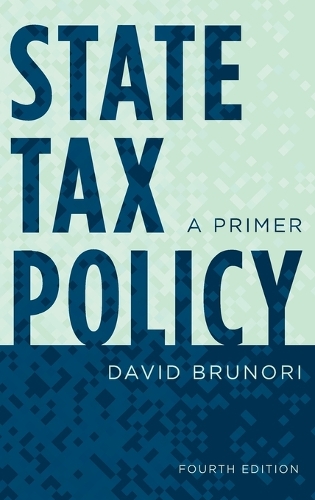
State Tax Policy: A Primer
(Hardback, Fourth Edition)
Available Formats
Hardback, Fourth Edition
Published: 26th October 2016
Paperback, Fourth Edition
Published: 26th October 2016
Publishing Details
State Tax Policy: A Primer
By (Author) David Brunori
Bloomsbury Publishing PLC
Rowman & Littlefield Publishers
26th October 2016
Fourth Edition
United States
Classifications
Professional and Scholarly
Non Fiction
Central / national / federal government policies
Political economy
336.2
Physical Properties
Hardback
176
Width 161mm, Height 237mm, Spine 17mm
404g
Description
State tax systems are in trouble. Revenue collecting methods developed more than a half century ago are straining to deal with 21st century economies. Globalization and e-commerce are changing the way people work and purchase goods; devolution has steadily shifted responsibility from the federal government to the states; tax incentives have become the weapon of choice in the battle to attract business investment. All of this, in an environment where antitax messages have become a staple of political campaigns, have made creating tax policy more challenging than ever before. In the updated fourth edition of State Tax Policy, David Brunori analyzes these and other critical challenges facing state governments. He identifies the important issues, and examines possible solutions in formulating and implementing state tax policy. State Tax Policy is the only book that provides students and professionals with a concise, approachable, and up-to-date introduction to the intricacies of state tax policy.
Reviews
States can manage the unprecedented fiscal challenges they face only if they have sound revenue systems. Many have systems more appropriate for economies of the past, not that of the 21st century. In this fourth edition of his classic work, Brunori examines state tax policy by postulating the basic principles for evaluating taxes (yield, economic neutrality, equity, ease of administration and compliance, and accountability), discussing the questionable (but popular) effort to use tax incentives to stimulate economic development, and exploring how politics complicates adoption of sound tax policy. He then devotes a chapter each to the special challenges confronting the major state taxes (sales and use, personal income, and corporate income taxes), plus chapters that overview other state taxes (mostly excises and property) and other state revenue. He manages to make technical and tedious problems of tax structure less arcane for non-specialists and those interested in creating productive and sound revenue systems. His concluding chapter is essentially a plea for states to pay more attention to the evidence as they restructure their taxes, and to keep their revenue systems in tune with changing economies. Summing Up: Highly recommended. Upper-division undergraduates through professionals. * CHOICE *
Author Bio
David Brunori is a journalist, author, educator, and lawyer who specializes in tax and government issues. He is the Deputy Publisher at Tax Analysts. In addition he serves as contributing editor to State Tax Notes magazine for which he writes the Politics of State Taxation, a weekly column focusing on state and local tax and budget politics. He is a research professor at the Trachtenberg School of Public Policy and Public Administration at The George Washington University where he teaches courses in state and local public finance and fiscal federalism. He also teaches state and local tax law at the George Washington University Law School. He has published numerous books and articles on state and local tax policy. His book State Tax Policy: a Political Perspective, won the 2001 Choice Award. He served as an appellate trial attorney with the Tax Division of the United States Department of Justice and practiced with a Washington DC law firm. He served as a David C. Lincoln Fellow at the Lincoln Institute of Land Policy from 2001 - 2004.
